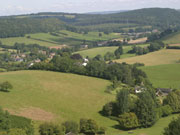 |
 |
 |
 |
I have a bundle of nineteenth-century documents on loan from Monica Margrett which refer to the "Manor and Parish" of Hope Mansell. I realised that I didn't really know whether the fact that Hope Mansell was a manor was of any significance, so I've been looking into it.
Hope Mansell appears in Domesday as a manor held by Edwulf and Leofric, a manor being a division of land under the feudal system. The manor was owned by the lord of the manor and the right to live on the lands was recorded in the manorial roll. Each tenant was given a copy of the relevant entry in the roll, and so they were known as copyholders. Each manor also had its own rules under which tenants held their land – which might be a number of days a year working on the lord's land, or readiness for military service, or payment in kind or cash. So in the documents the phrase "according to the customs of the manor" always qualifies a statement of the copyholder's holding.
There are two documents in the Herefordshire archive recording the granting of the manor of Hope Mansell. The first is from Dore Abbey, and the second from St Peter's Abbey in Gloucester. Since the pre-conquest manor was held in two parts, it's possible that part of it was later held by Dore Abbey. When the abbey was dissolved in 1536 the holding passed to St Peter's in Gloucester, which already held the rest of Hope Mansell. St Peter's Abbey was dissolved and became a cathedral at the centre of the new diocese of Gloucester, and in 1542 our manor was assigned to the diocese of Gloucester, where it remained.
Though the Lord of the Manor was the Bishop of Gloucester, there was also a "Farmer Lord", who presided over the manorial Baron Court, and (in the documents I've seen) in 1887 was George Bonnar, and in 1929 was George Ricketts Bonnar – by then known as Steward (which is less grand but more accurate) and resident in Gloucester.
The manor finally ended in 1929 following the passing of the Law of Property Act of 1922, which abolished copyhold and manorial rights and privileges. Copyholders became freeholders on payment of compensation to the lord of the manor.
Weston-under-Penyard was also a manor, which in 1872 belonged to Lord Ashburton, who owned Rudhall but didn't live there. At the moment, that's all I know.
Ian Lewis
First published October 2019